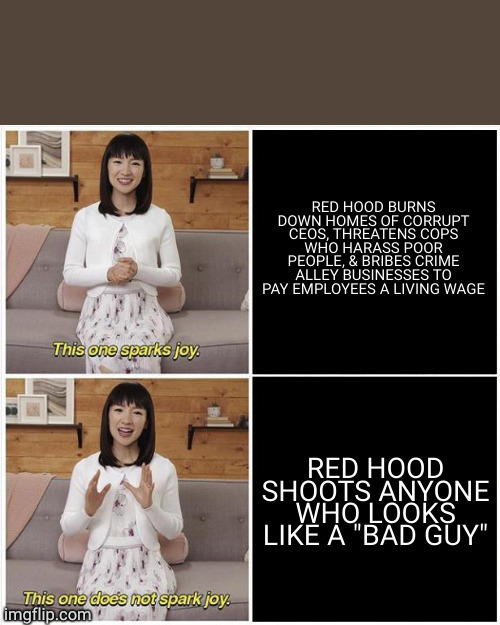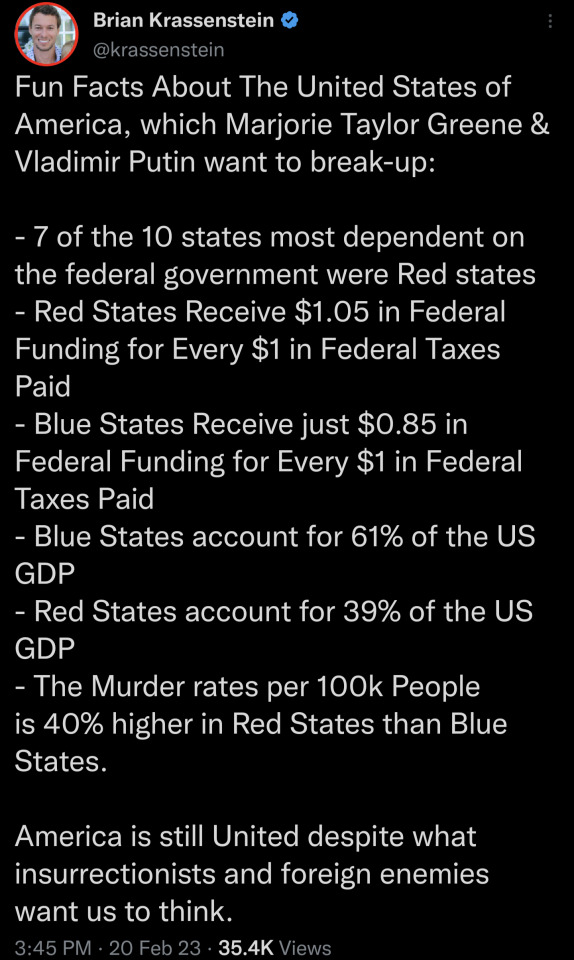#funding rates
Text
In complete seriousness, they need to make laws about ads that say they can take no more than one, maybe two, clicks/taps to close/skip. No more "wait 10 seconds until you can skip the video, wait 10 seconds until you can skip the fake playable ad, wait 5 seconds until you can close the 'download now' overlay, puts up a half-screen in-app appstore pop-up (which at least you can close immediately)." This should literally be illegal to do.
Edit: this is blowing up so I just wanted to add (haha ad) that this was my "reasonable request" I also think there should be way more and way stricter laws around all advertising in general. I think most advertising as we know it today should be abolished.
#ThornShadow.said#advertising#edit: I also have this sick pin on my jacket that has a “no” symbol with ads#and text that says 'abolish advertising in the media // replace this source of funding with government funding based on independent ratings'#not my idea but now that it's been presented to me it doesn't sound bad#like there are film funds and art funds and whatnot
40K notes
·
View notes
Text

#cryptotrading#Crypto#CryptoTwitter#Ethereum#cryptocurrencies#cryptofunds#Traders#investment#business#newblogflo $LINK $DOGE $XRP $PEPE $MONG $QNT#bitcoin#newblogflo#secretstime#funding rates#crypto funding rate#crypto#funding rate#funding rates crypto#funding rate explained#funding fee#funding rate binance#crypto trading#funding rate strategy#funding rates explained#what is funding rate#funding#funding rate crypto explained#crypto investing#binance futures funding#crypto funding rates explained
0 notes
Text
She has added bronchitis to her bingo malady card 😞
She had been a little congested. She got antibiotics for it in the form of a shot on 12/27 but it didn't clear up, probably due to the other stressors (enema, hospital stay, a rare condition, etc). This morning she sounded just awful. I worried I got food into her lungs. I didn't.
Her vet's office closes on Wednesdays so we went back to the local place. They took an x-ray to see if she had aspiration pneumonia, regular pneumonia or something else. I learned that aspiration pneumonia shows up in a different part of the lungs than regular pneumonia. She has bronchitis. No fever. She's actually below regular temperature so it's good she has all of her heated areas.
She's not sneezing, coughing, or leaking out of her nose. She just sounds different levels of snotty. Horky girl.
I've been heating up water with catnip in a small paper cup and sticking her muzzle in the cup for as long as she'll tolerate the steam. We're currently in the bathroom with a hot shower running. I've also been wiping at her sinus areas with a not too hot towel to help loosen crap up.
I'm just glad I'm not working this week. Next week is going to be interesting.
#poor kitty#it's just one thing after the other#Gigabyte#at this rate she'll need her own go fund me or something
40 notes
·
View notes
Text
Important‼
Sharing this again with an important note. The currency for this fundraiser is in Swedish Krona (kr or SEK). I URGE YOU TO LOOK UP THE EXCHANGE RATE WITH YOUR LOCAL CURRENCY before donating! For example, $25 USD is equivalent to 272 krona.
Too many donations to this campaign have been really really small like 5 krona. If that's all you can genuinely give no problem (every bit helps)! BUT I think not understanding the exchange rate is part of why some of these donations are so low.
Also, the campaign hasn't moved in a couple weeks. I've sent Gaza Funds a message to highlight it but still, please share and donate if you can!
#gaza#gaza fundraiser#go fund me#signal boost#important#donations#gaza donations#exchange rate#help if you can#please share#free gaza#palestine#free palestine#current events#gofundme
23 notes
·
View notes
Text
Physically, I am getting through it.
Mentally, I am laying on the ground kicking my feet and screaming that it isn't fair.
#i hate that i have to work a second job while im in school#did you know we (grad students) arent technically allowed to have second jobs?#because our funding is supposed to be such a generous stipend that we can focus all our time on studying#lol#lmao even#the grad student stipend hasn't gone up in almost 10 years#and it wasnt great to begin with#at a conservative estimate my rent is going to double when i move out of my current place#and its only the rate it is now because i signed onto a four year lease#landlord has been itching to raise it for a couple years now#frankly the university should be ashamed of whay they're paying us
37 notes
·
View notes
Text
WAIT


U MEAN THESE ARE THE BANNERS FOR 4.7 ???????
#WHAT IF I CRIEDLF#the biggest w is dain coming back tho idc idc#but clorinde if u dont come home.... AND IF I HAVE SPARE FUNDS THEN WEAPON BANNER BC HAITHAM OR CLORINDE WEAPON IS A W#<- assuming i win my cloridne 50/50 and even get a rate-up weapon#im sorry daughter sigewinne... ive wanted clorinde ever since the fontaine teaser......#also i still need to watch the livestream and the traveller animated short ;w; ill do that later bc i need to speedrun the new event before#it goes away today in a little over 7 hours 🫡#im not bothering with windtrace tho i dont have the energy to battle with hunters over some mechanics#just genshin <3
17 notes
·
View notes
Text

#I want to donate a little bit of money.#not much. I am unemployed and the exchange rate is terrible#but I want to donate a bit to palestine right#the issue is there's so much conflicting reports about whether the aid ever reaches them or not#mersal foundation is running a charity campaign for feminine hygiene and medical products with red crescent palestine#and I want to donate to that#but are they getting the aid. and if it's red crescent I might as well#donate to my own country's red crescent#and if I'm doing THAT I might as well just buy dinner for the president#that's the issue with ME charities. no offense to anyone but if you know you know. and I know#charity tracker doesn't seem to have much info on mersal either#I can also just donate to palestine legal US or palestine action UK#the former is a legal fund for people who lose their jobs and shit to new wave mccarthyism and the other one is#the lads protesting in the UK apparently#but like. I want to donate to palestine#and it's really a small amount too hgjkfgnkds seriously there's no need to go this far for 20 dollaroos#but that's like 1/5ths of my rent right#do you understand#anyway does anyone have any suggestions
25 notes
·
View notes
Text
Ask the Bitches: How Do I Prepare for a Recession?
We’ve gotten a lot of questions recently about a hypothetical looming recession. The stock market has taken a bruising; bellwether companies are stumbling. Do such omens and portents mean that another recession on its way?
The good news is, we can answer this one very easily.
Yes. Another recession is coming.
We know this with 100% certainty.
How?
The same way we know with 100% certainty that Piggy and I will be dead within the next hundred years. It is in the nature of a living being to die, just as it is in the nature of economies to grow and contract. The sun rises; the sun falls. The tides go in; the tides go out. It’s just the way things are.
Sounds kinda shitty, right? It’s possible that, someday far in the future, someone will devise some new system that will smooth out or even eliminate these cycles. Maybe the nature of goods and services will change so fundamentally that economies will transform in ways we can’t even imagine. But that’s Phillip K. Dick stuff—innovations that live so far in a hypothetical future that they’re still science fiction. You should plan to endure these market cycles throughout your lifetime.
And yes, there are lots of things you can do to make yourself more prepared. Let’s go through them.
Keep reading.
If you liked this article, join our Patreon!
#recession#interest rates#how to prepare for a recession#depression#economy#money tips#personal finance#debt#emergency fund
41 notes
·
View notes
Text

we are missing out on a huge opportunity for Jason Todd to be a force of Chaotic Good
#red hood#jason todd#look if he's the protector of crime alley and Gotham's downtrodden#I'd expect a lot more effort put into destabilizing the systems that keep people down#burn down the payday loan place and replace it with a nonprofit equivalent with a 0% interest rate#subsidize an afforable grocery store because you know that place is a food desert#buy up the slums and remodel them to be safer and cleaner and healthier without increasing rent#put up needle exchanges and safe-injection sites#ban cops from setting foot in the district without a warrant#ban stop-and-frisk#ban cops from schools#FUND THE SCHOOLS#put everyone on triple food stamp benefits#free medical clinics and dentists every 3 blocks
115 notes
·
View notes
Text
Since I like numbers when I need to focus, in order to reach 90% funded before the Thursday debate stream we'd need to raise roughly $202 per hour between now and then, which feels totally achievable since if we're looking at how things have been going since the start of the last Sunday stream we've been raising roughly $535 per hour.
#tin can bros#I mean if we keep going at the current rate we'll hit 90% funded before this time tomorrow#so even with anticipating a slump in between the streams it seems totally possible#actually let's see if we keep up this rate we'll be fully funded by Friday morning#which I doubt will happen because like I said I anticipate a slump but still cool!#it would be really awesome if it could be fully funded before the final stream so they could hopefully get some rest#they have been working so hard this month and I'm just like if I were them I'd sleep until mid March after this
13 notes
·
View notes
Text

#us politics#twitter#tweet#2023#brian krassenstein#red states#blue states#blue states pay for red states#rep. marjorie taylor greene#vladimir putin#federal funding#federal taxes#gross domestic product#murder rates#domestic terrorism#russia#imperial russia#foreign adversaries
65 notes
·
View notes
Text
#funding rates#crypto funding rate#crypto#funding rate#funding rates crypto#funding rate explained#funding fee#funding rate binance#crypto trading#funding rate strategy#funding rates explained#what is funding rate#funding#funding rate crypto explained#crypto investing#binance futures funding#crypto funding rates explained#trading funding rate#how to check crypto funding rates#crypto market#trading crypto#funding rate binance futures in hindi#business#newblogflo#secretstime
0 notes
Text

A goth filling in their tax returns
#been messing with ai#it's not well known but goths pay a higher tax rate than normal folk#but it's generally offset by their council funding for being a goth
5 notes
·
View notes
Text

I finally buckled down and did some research on non-acetone nail polish remover and bought the ella+mila soy based remover and my nails haven't felt this strong in almost a year!
I am so impressed, I'm never going back. It's a lot more expensive than acetone based remover (all of the oil based/non acetone ones are) but SO worth it!
#nails#finger nails#acetone free polish remover#ella+mila#not thrilled that its peta certified#but it seems like all of the top rated acetone free removers are#and its a one time fee for the certification#so its not like sales are going towards funding peta#i might try other brands#but i KNOW this one works for me#and it works so well
16 notes
·
View notes
Text
It’s really frustrating seeing the common narratives about college when you work at a community college because everyone forgets you exist. “College is prohibitively expensive.” Community colleges are a lot cheaper and a lot of states have programs that cover a lot of it for you. “It’s so competitive; you have to start a nonprofit by the age of 16 to get in.” Our acceptance rate is 100%. “Colleges just give students useless degrees; we should be preparing people for the workforce.” We have an automotive repair program.
#not that I think there's anything WRONG with liberal arts degrees#I have one#but community colleges have a lot of job prep programs#we've got a bad rap and our completion rates ARE low#but a lot of students don't go to ccs with the intent of completing a degree#(retirees taking free classes employees reskilling students planning to transfer and knocking out gen eds)#also we don't get any goddamn funding
125 notes
·
View notes
Text
Shortly after wrapping up an inaugural legislative session in 2019 that included hiking the state’s minimum wage, legalizing cannabis and passing a historic $45 billion statewide construction program supported by expanded gambling and a host of increased taxes and fees, Gov. J.B. Pritzker sought to reassure a group of Chicago business leaders that he wasn’t just another tax-and-spend liberal.
Addressing the Executives’ Club of Chicago, Pritzker, a billionaire heir to the Hyatt Hotels fortune and a prominent tech investor, said he would pursue a “rational, pragmatic, progressive agenda” that ultimately would pay dividends for the state budget and Illinois’ economy.
“I’m a businessman. I’m a progressive. I’m a believer in growing the economy and lifting up people’s wages,” Pritzker said at the time.
Now in his second term and preparing to play host to this summer’s Democratic National Convention in Chicago, while also eyeing his own future White House run, Pritzker’s identity as a self-described “pragmatic progressive” is being put to the test. The state faces its most challenging budget outlook since the first year of the COVID-19 pandemic, the governor continues to grapple with controversies over his handling of criminal justice issues and leaders on both sides of the political divide say Pritzker’s approach sometimes falls short of fully addressing the state’s biggest problems.
The latest assessment of Pritzker’s strategy will undoubtedly play out in Springfield in the coming weeks.
With March primaries come and gone, work is underway in earnest on approving a state spending plan for the coming budget year before the General Assembly’s scheduled May 24 adjournment. The proposal Pritzker laid out in February attempted to build on past progressive successes — such as last year’s expansion of state-funded preschool programs — without overpromising and potentially jeopardizing the state’s hard-won credit upgrades, a core accomplishment the governor guards jealously.
It’s a balancing act that’s key to Pritzker’s political persona as he builds his national profile, and one that will hinge on the governor’s ability to satisfy Democratic lawmakers who want more money for their legislative priorities while not resorting to the kinds of budgetary gimmicks that created the state’s long-running fiscal instability.
“Obviously the governor and his administration carry forward sort of a number of elements of the core progressive banner in terms of policy and program, and that’s a part of an identity,” said Joe Ferguson, president of the Civic Federation, a nonpartisan budget watchdog. “What is not usually coupled with that identity is fiscal responsibility. … This sort of fiscal responsibility is a kind of kryptonite against the narrative that would usually come from conservatives.”
‘ISN’T ROOM FOR OTHER SPENDING’
While Pritzker promotes the “pragmatic progressive” agenda publicly, he also pushes it privately. In a February text to state Rep. Jehan Gordon-Booth of Peoria, the top budget negotiator for the House Democrats, the governor noted that “almost all of the few new things” he was introducing in his budget plan were at “no cost (or very low cost).”
“There is a bunch of stuff focused on the Black caucus, including addressing maternal mortality,” Pritzker wrote to Gordon-Booth in the message, obtained through an open-records request. “But there really isn’t room for other spending this year.”
Indeed, Pritzker’s plan both dabbles in progressive priorities — a child tax credit and a sales tax measure that will skim some funds away from big retailers — while also keeping an annual increase in school funding to the minimum amount required by law and steering clear of more structural tax changes pushed by progressives.
A few points the governor made in his proposal seemed tailor-made for bipartisan appeal: a $12 million child tax credit for low- and moderate-income families and the elimination of the state’s 1% sales tax on groceries.
While also popular with Republicans, elimination of the grocery tax has progressive appeal because Pritzker has framed it as an effort to abolish a regressive tax that hits those on the lowest rungs of the economic ladder the hardest. It’s also a tax cut that is easier on the state’s bottom line in a tight budget year because revenue from the tax flows not into the state’s coffers but to local governments.
The day after Pritzker’s budget address in February, state Sen. Donald DeWitte, a St. Charles Republican, said he was “thrilled” Pritzker proposed scrapping the grocery tax, but he said the governor should also be devising a way to ensure local governments don’t pass the burden of the lost revenue onto residents. While it’s possible Pritzker could be trying to appease the GOP, the proposal doesn’t go far enough, DeWitte said.
“Any opportunity to take stress off of Illinois families is a good thing,” said DeWitte, a former mayor of St. Charles who also serves as one of the Senate GOP’s budget negotiators. “But there are always ramifications that have to be dealt with, and so far, I don’t think the administration has been willing to deal with the ramifications of simply removing that tax without considering the other side of that revenue equation, which is the hit that will go to local governments.”
The Civic Federation still is evaluating the governor’s budget proposal, including the idea of eliminating the grocery tax, but Ferguson said it’s important to look at that idea in the full context of all the state funds that flow to local governments.
“You have to do the math on what additionally has been sent to the local level with what is essentially being taken away with the grocery tax and see what it amounts to,” Ferguson said. “It amounts to a far less dire situation than the localities appear to be projecting.”
Another idea with the potential to attract Republican support is the child tax credit. But both DeWitte and some progressives find themselves in the odd position of agreeing with each other in supporting the idea but also thinking it could be more ambitious.
“The governor has allocated $12 million for this, and that just doesn’t get you very far,” said state Rep. Will Guzzardi, a Chicago Democrat who co-chairs the House Progressive Caucus.
Democratic state Sen. Mike Simmons of Chicago has introduced a more robust tax credit than the one pitched by Pritzker; it would cover families with children up to age 17, rather than age 3.
Negotiations for the credit, as well as the rest of the budget, are ongoing.
“It was a win that the governor put this in his budget. It allows us to have this discussion at another level,” Simmons said.
TIGHT FISCAL REINS
Several of the governor’s belt-tightening measures — from increasing school funding by the bare minimum to cutting back on state-funded health care for immigrants who are in the country without legal permission — have drawn scrutiny from his political left.
While Pritzker speaks frequently about the importance of education funding and brags about boosting funding for elementary and high schools by more than $1.4 billion since taking office, the reality is that he’s only kept up with the minimum target of increasing state funding by $350 million per year.
Advocates long have warned that those increases are not enough to meet the state’s goals of adequately funding public schools under a state aid formula signed into law in 2017 by his predecessor, Republican Gov. Bruce Rauner.
Failing to go above the minimum increase has been a long-running source of frustration for Rep. Will Davis, a Democrat from south suburban Homewood who was one of the sponsors of the 2017 school funding overhaul and chairs the House Appropriations Committee that oversees K-12 funding.
“We tried to put a trajectory out there to try to get to full funding. And the reality, I don’t think we’ll ever actually get to that,” said Davis, who for years has pushed for at least a $500 million increase annually. “But we have to make bigger strides to at least show that we’re trying to get to what we would call full funding.”
Although Davis notes the education funding formula was crafted when Rauner, not Pritzker, was in office, the Democratic lawmaker said that doesn’t alter his overall message to Pritzker.
“Governor, why not work with us? Let’s make sure that we find the resources so that we can ramp up the funding in a different way,” Davis said a few days after Pritzker pitched his budget.
This year, Pritzker and state lawmakers will face added pressure to boost school funding from the politically progressive Chicago Teachers Union, which has signaled it will be looking to Springfield for more money for Chicago Public Schools as it negotiates a new contract with a City Hall run by its strongest ally, Mayor Brandon Johnson.
Tensions between Pritzker’s progressive ideals and his pragmatic approach also have arisen over state-funded health insurance for older Illinois residents who are in the country without legal permission.
The debate over how to deal with ballooning costs in the program delayed passage of the state budget last year, a dispute between Democratic factions — including Black and Latino lawmakers and moderates and progressives — that was only resolved when Pritzker agreed to a deal that gave his administration the power to rein in the program’s costs.
His moves to close enrollment for younger participants, begin charging co-pays and, more recently, to stop offering the program to green card holders who are in a five-year waiting period for federal Medicaid benefits, have drawn the ire of immigrant rights and health care advocates and some progressive lawmakers.
Last month, for example, Rep. Norma Hernández, a Democrat from Melrose Park elected in 2022 with the backing of progressive stalwart U.S. Rep. Jesús “Chuy” García, criticized the latest move as a “short-term cost-saving measure, not a long-term” solution.
In his proposal, Pritzker suggested spending on the program from the state’s general fund be reduced to $440 million, which is $110 million less than what was committed this fiscal year. But the administration is also proposing spending nearly $200 million more on the program from other funding sources, with much of that money coming from a federal match to emergency services funding.
The maneuvers have created some dissonance between Pritzker’s actions and political rhetoric. In a news release touting the expansion of eligibility to those ages 42 to 54 in 2022, he declared: “From day one of my administration, equity has been — and will always be — our north star. Everyone, regardless of documentation status, deserves access to holistic health care coverage.”
‘GROW THE PIE’
In the longer term, some progressives are looking for additional moves that would bring in more revenue from the richest Illinoisans and large corporations, Guzzardi said.
A tax change for retailers was one example that made it into the proposed budget, Guzzardi said. Pritzker proposed capping the money retailers can keep from sales taxes, essentially resulting in higher taxes for those businesses and more revenue for the state.
Beyond that, progressives have other ideas “about how we could grow the pie,” Guzzardi said.
“The governor’s introduced budgets don’t include those ideas, that’s true. But working within the framework of the dollars that we have, I think the governor has done a really strategic job of investing those dollars in our shared progressive priorities,” he said.
Since Pritzker’s boldest progressive proposal to change the state’s tax structure — a state constitutional amendment to create a graduated-rate income tax — was resoundingly defeated at the ballot box in 2020, thanks in large part to efforts by the state’s business community, the governor has focused on more arcane ways of boosting state tax revenue.
Aside from the retailer sales tax change for next year, an idea that’s been proposed and rejected previously, Pritzker is also suggesting limiting an inflation-based increase in the personal income tax exemption, essentially increasing taxes on individuals by $93 million.
PRISONER REVIEW BOARD TUMULT
The state budget isn’t the only arena in which Pritzker at times has had to triangulate his progressive policy positions with pressures from the political center and the right.
Recent tumult at the state Prisoner Review Board brought the spotlight back on the Pritzker-controlled institution that decides which state prisoners are paroled.
The makeup of the Prisoner Review Board has changed noticeably during Pritzker’s time in office — early on being labeled by Republicans as too liberal and later being criticized by some prisoners’ rights and criminal justice reform advocates for taking too hard of a line and preventing older inmates from getting the paroles they sought, moves conservatives applauded.
But in March the review board became a focus yet again when parolee Crosetti Brand was charged with stabbing 11-year-old Jayden Perkins to death and seriously injuring his mother, with whom Brand used to be in a relationship.
Released on parole in October for a separate crime, Brand was back in state custody in February after he allegedly tried to break into the residence where Jayden and his mother lived. But a three-member review board panel decided to release Brand after determining the panel didn’t have enough evidence from Jayden’s mother’s allegations to keep him behind bars.
Days after the attack made headlines, the board’s chairman, Donald Shelton, and another member resigned.
In announcing one of the resignations, Pritzker said it was clear “that evidence in this case was not given the careful consideration that victims of domestic violence deserve” and suggested reforms could be made to the way the board functions.
For Pritzker, the resignations should be “a feather in his cap,” showing that he’s willing to admit there was a grave mistake within an agency that falls under his purview, said Christopher Mooney, an emeritus professor of political science at the University of Illinois at Chicago.
But Mooney also said the board’s actions in the Brand case could entice Republicans or any other detractors to politicize Jayden’s death and use it against Pritzker if he tries to run for president.
It’s been done before, Mooney said, referring most notably to the 1988 presidential election when Republican George H.W. Bush used the early release of Willie Horton, a Massachusetts murderer who went on to commit other crimes, to paint Democrat Michael Dukakis as soft on crime.
Already, Senate Republicans have used Jayden’s death against the governor.
Illinois Sen. Jason Plummer, a Republican from Edwardsville who sits on the Executive Appointments Committee, blamed Pritzker in two lengthy social media threads about the board’s shortcomings, criticisms he echoed at a news conference and in an appearance on Fox News.
Although Pritzker called for additional training for review board members on how to handle cases where domestic violence is involved, the Senate Republicans are pushing for broader changes.
Their proposal includes requiring that appointees to the board have 20 years of experience in the criminal justice system as a prosecutor, criminal defense attorney, judge, probation officer or public defender. The GOP plan also would require victims be immediately notified of a prisoner’s release under certain circumstances and increase transparency requirements for the board.
While Senate Republicans were previously successful in 2022, when crime was a key campaign issue both statewide and nationally, in pressuring Democratic colleagues to oppose a couple of Pritzker’s appointments to the board, it’s unclear whether the GOP’s superminority will be successful again.
But Mooney and other observers have questioned how effective the Republicans will be.
“As it stands right now, it doesn’t sound like it’s going to go very far,” Mooney said the day after the board’s resignations were announced. “No. 1, because Pritzker’s all over it.”
#us politics#news#chicago tribune#2024#illinois#Gov. J.B. Pritzker#progressives#Democrats#Rep. Jehan Gordon-Booth#Sen. Donald DeWitte#Rep. Will Guzzardi#Sen. Mike Simmons#Rep. Will Davis#Mayor Brandon Johnson#Rep. Norma Hernández#Rep. Jesús “Chuy” García#Sen. Jason Plummer#state budget#taxes#public education#state-funded health insurance#graduated-rate income tax#personal income tax exemption#Prisoner Review Board#criminal justice reform
3 notes
·
View notes